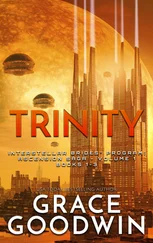“That will incapacitate the entire field?”
“With reasonable assurance.”
“When?”
“They are supersonic. They could be there in minutes. With the communications…”—he turned and stared hard into the Premier’s ravaged face—“and the psychological difficulties, it might take twenty or thirty.”
“Order them into the air, comrade.”
The general’s powerful shoulders slumped, seeming to collapse under the weight of the massive array of medals and ribbons strung across his breast. “This is the price of my appointment, Comrade Premier? My first order is to destroy my own forces?”
“Your first order is to save the Soviet Union, comrade.”
The general’s blue eyes had turned gray with agony. He nodded stiffly and left the room. The Premier watched the man’s back for a moment, subduing the thought that his own rationality might be as questionable as that of his far-off ICBM wing commander. The devil has taken me, he thought. I have just ordered my own people killed on the remote chance—and it is most remote—that the Americans will not kill them. When such twisted logic makes sense, all hope is gone. He slumped and turned back to the screens. He moved his eyes quickly away from the missile display and escaped to the relative peace of the space-satellite screen. Ah, my stars above, he sighed, how much more pleasurable it was to play with your rockets. And there are so few of you now.
Suddenly his frazzled mind focused perfectly. He cursed the fog that had prevented him from seeing such simplicity earlier. He bolted up from his chair. Simultaneously his radio operator also stood, a look of confused concern on his face. He frantically signaled the Premier. The Premier’s heart sank, his first thought being of Leningrad. He looked at the clock. 2021.
“Fire in Number Four,” Moreau said.
“Shut it down.”
“Done.”
“Rudder.”
“Got it.”
Kazaklis looked left through the horizontal slashes of water on the window. He could see the outline of Number Four, the nearest inboard engine. It appeared to have blackened fire streaks. But by now he knew they were suffering from various optical illusions. The “leans” could have them flying at a tilt to the horizon, the lack of any visual frame of reference making the appearance of level flight an uncertainty. The plane could be nosed up slightly. It could be nosed down, which was more likely. They could fly with six of their eight engines, even lose a couple more in normal weather. But not for long in this mess. “Altitude?” he asked.
“You kidding?” Moreau replied with rigid calm.
“Can we cross-reference?”
“Negative.” Moreau tugged on the wheel. “Try the EVS.”
Kazaklis switched the green screen from its normal viewing system to terrain tracking. The small yellow thermometers appeared on the right of the two screens, darting up and down. Kazaklis winced. The computer clearly was converting the storm’s violence into a false surface. But unless it was lying completely, they were well below two thousand feet, the system’s range. The aft section of the plane lurched ferociously in a sudden gust, jerking Kazaklis toward Moreau and Moreau into the side of the cockpit. The tear of ripping metal raged through the other aircraft noise. The B-52 sounded like an old man dying, moaning, creaking, wheezing, in the somber half-light of the last call.
“Shit,” Kazaklis said. “We’re gonna lose the rudder and the stabilizer. We gotta get some altitude.”
“Thanks. Which way’s up?”
“Been askin’ myself that all my life.”
“Very funny.”
“Always figured it had to be the other way.”
Suddenly, out of nowhere, without a downdraft or a gust, a calamitous whomp sounded in the belly of the plane. The Buff bounced like a flat rock on water. Kazakhs swiveled his head left. The murk had thinned. Far off he saw streaks of yellow in the darkness. He also saw that the two inboard engines, numbers three and four, had broken off and fallen into the sea. And he saw the sea just below, frothy, ugly, gray, and deadly with swells of sixty or seventy feet. He knew that one of those swells had just tickled their belly, and not with a feathery touch.
Moreau looked out her window. “You’re right,” she said quietly. “It’s the other way.”
The two of them wrenched at the controls.
“We’re not going to make it,” Kazakhs said.
“Yes we are.”
“Prepare to eject.”
“I’m not ejecting, Kazakhs.”
“I really want you to make it, Moreau.” She looked at him, and he had pleading in his eyes. They both turned to look down from their side windows. She shook her head slowly. Kazakhs nodded and went quiet. She wouldn’t make it in that caldron, either. Without conscious thought, rote being his guide now, Kazakhs kept the Polar Bear’s nose pointed into the distant streaks of yellow. They seemed very far away.
The Premier stood over his radio operator, babbling almost incoherently. “Jam the swines!” he ordered, his face purple with rage. The radio operator shrank back in fear of the man’s wrath. “Comrade Premier,” he said with trepidation, “we do not have the capability.” The Premier pounded a fist on his subordinate’s desk. “Order a submarine attack!” The operator cowered further. “Comrade, you know we can’t get through.”
The Premier’s face sagged. “They can use our equipment to reach their submarines, and we can’t do the same to reach ours?” he asked.
“They are communicating with an aircraft relay, Comrade Premier,” the radioman replied. “Not with submerged submarines.”
The Premier placed his hand on the man’s shoulder to assure him the blame was not his, the anger born of frustration. He cursed himself again for a brain so muddled it had allowed the American pretender to discover the answer moments before he made the same discovery. Dejectedly he looked at the intercepted message. It was brief, making contact, awaiting the request for the codes he had just burned. He turned his gaze toward the clock. 2022. He must call the President immediately. Condor, the foul bird, was using his Volna satellites to contact the American submarine-control planes.
The Librarian rushed excitedly around the compartment, patting technicians’ shoulders, shaking limp hands, not noticing that few of the others in the room shared his enthusiasm for this coup. He had two brief replies, one from each TACAMO plane, seeking NC A code confirmation and orders. He moved quickly to the phone.
Condor answered somewhat irritably. “You interrupted my prayers, colonel.”
“I have the answer to your prayers, sir,” the Librarian said.
“Didn’t expect the answer by phone,” Condor replied drolly.
“Sir, I’ve reached the TACAMO planes. It’s in the bag. You will have to come down with the authenticator card.”
The phone went silent for a moment. Then Condor asked, “How in the Lord’s name did you do that?”
“Straight through a couple of Soviet satellites, sir!” the Librarian exulted. “How’s that for shoving it to them?”
“Be right down, colonel,” Condor said, adding: “Man deserves the Medal of Honor for somethin’ like this.”
The Librarian cradled the phone. It occurred to him ever so briefly that the award would be posthumous. But then, that is the most valorous kind. Still, the thought of death reminded him of the Looking Glass. He cast a hurried look at the clock—2024—and reached again for the phone, pushing the button for the cockpit.
“Where the hell is Alice?” he demanded of the pilot.
“Right on our tail, sir,” the pilot replied.
“You keep that bastard off us for another fifteen minutes, major,” the Librarian snapped. “If you want to win this war.”
Читать дальше












